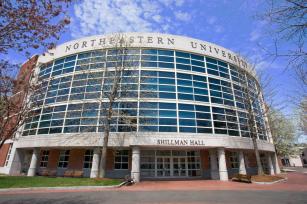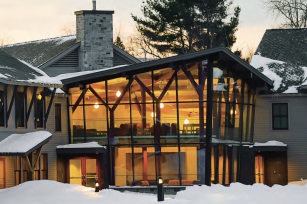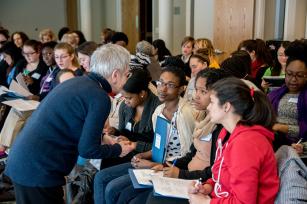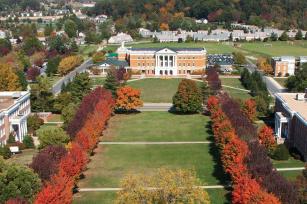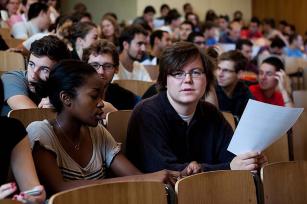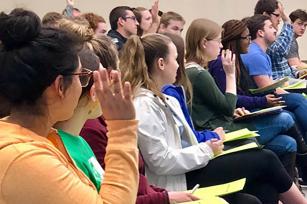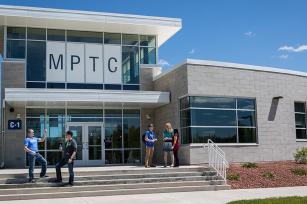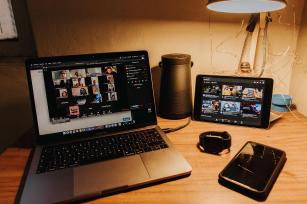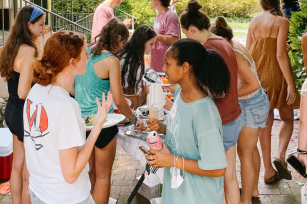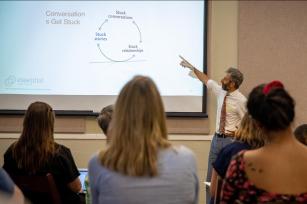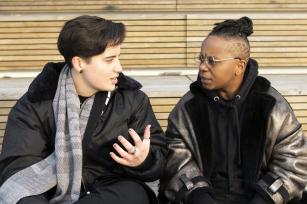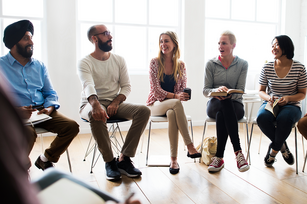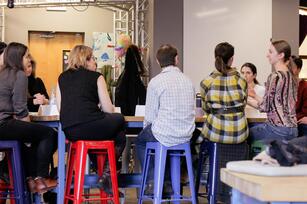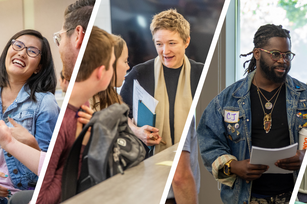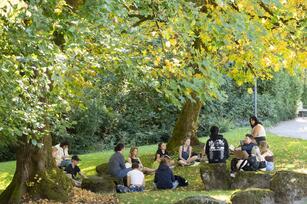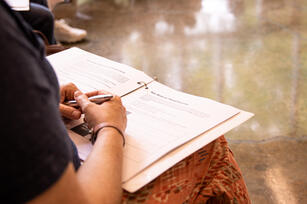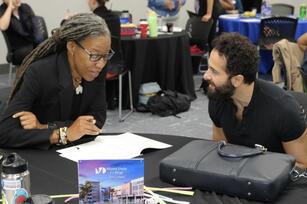
Breadcrumb
- Essential Partners
- Our Impact
- Impact Stories
- Reflective Structured Dialogue Transforms Shenandoah University
Reflective Structured Dialogue Transforms Shenandoah University
In December 2023 in response to the October 7 Hamas attacks on Israel and after Israel’s bombing and invasion of Gaza, Virginia’s Shenandoah University (SU) hosted a campus-wide dialogue as part of its Shenandoah Conversations (SC) program. The event utilized the Essential Partners (EP) practice of Reflective Structured Dialogue (RSD), which faculty and students had been trained on beginning in late 2017.
After the dialogue, one student described a moment between herself as a Jewish student and a Palestinian American student. “They mutually declared that they had seen each other as humans,” recalls Kevin Minister, director of Shenandoah Conversations, professor of religion, and academic associate at EP. The university president, Tracy Fitzsimmons, told the full faculty that she had many students visit her office, telling her it was one of their most transformative educational experiences. That included students who had struggled to find a sense of belonging on campus in the lead-up to the dialogue.
Minister says, “The way that the Shenandoah campus was able to come together and have a conversation was fundamentally different than it would have been six years earlier. [RSD] has transformed a campus culture. Because of the cultural impact of RSD, something was possible that was not possible before.”
Shenandoah Conversations Is Born
Located in Winchester, Virginia, Shenandoah University is a private university that blends professional career experiences with wide-ranging education. With 2,600 undergraduate students and 1,800 graduate students, SU is a diverse campus that ranges from the College of Arts and Sciences and the School of Business to the Shenandoah Conservatory and the School of Pharmacy.
In 2017, the Unite the Right rally in Charlottesville, just two hours south of SU, alarmed faculty and students. “Our students wanted to talk about it. Our faculty wanted to talk about it,” says Adela Borrallo-Solis, professor of Hispanic studies and Shenandoah Conversations’ founding director. “But we didn’t know how to do it. We decided we needed the tools from Essential Partners.”
In late 2017, three SU faculty members trained with EP: Kevin Minister; Cooper Minister, professor of religion and now a director of Shenandoah Conversations; and Christin Taylor, associate professor of English. They brought that training back to SU in Fall 2018. Shenandoah Conversations was born. The university adopted a plan to incorporate a customized version of EP’s Dialogic Classroom (including RSD) as part of its undergraduate general education requirements with connections to experiential learning and written communication. While graduate programs are not required to use RSD, some graduate faculty use the method in their courses as well. Eventually, extracurricular dialogues were added to the mix.
By any measure, Shenandoah Conversations has been a huge success. More than 150 faculty members have been trained in RSD facilitation, comprising 40 percent of the total faculty. Over 3,400 students have participated in RSD at some point, and over 275 student fellows have been trained to facilitate dialogues. Nearly 200 courses with an RSD component have been implemented so far, with about 40 offered each year.
“RSD has been the most transformative thing in my 21 years of teaching. … Students have a greater desire to open up in class about things because they know that a Noyalas class is a safe environment. ‘I can say things here. I’m not going to be judged. I understand I’m contributing to a broader conversation.’”
Jonathan Noyalas, Director of the McCormick Civil War Institute
Shenandoah University
Shenandoah Conversations in the Classroom
Faculty responded enthusiastically to this new way of teaching, with so many wanting training that sessions had to be offered each fall and spring.
“Essential Partners was integral to the possibility of doing this kind of work,” Minister says. “EP empowers campus leaders to customize RSD to their context.” With the tools from the customized version of EP’s Dialogic Classroom and the freedom to adapt those tools to the SU environment, faculty began stretching the boundaries of their teaching in exciting ways.
Classroom-based RSD allows students to grapple with controversial topics. Jonathan Noyalas, director of the McCormick Civil War Institute, teaches courses on public history and Civil War memory. He uses RSD to confront numerous challenging issues, including historical monuments and memorialization. When he took the training, he was looking for a way to get students to engage with uncomfortable material that traditionally would cause some students to put up their defenses and shut down. Despite his initial skepticism that the EP approach was another passing fad, Noyalas says that RSD “has been the most transformative thing in my 21 years of teaching.”
“The students have really bought into RSD,” says Noyalas. “Students alter their perspectives and viewpoints. The students now understand the gray areas of historical memory and how you address those.” Students’ motivation to delve deep into hard subjects has also increased. Noyalas reflects, “Students have a greater desire to open up in class about things because they know that a Noyalas class is a safe environment. ‘I can say things here. I’m not going to be judged. I understand I’m contributing to a broader conversation.’”
Other faculty have used RSD to address the learning process itself. In a chemistry lab course, students discuss how to work effectively in groups and how to collaborate across differences. In costume design, students develop communication norms for the theater production shop after discussing respectful ways to design for other people’s bodies while considering gender and culture. The School of Pharmacy incorporates RSD in its interprofessional education program to focus on how people from different health professions at the university learn to work together.
Bronwen Landless, associate professor of music therapy, invites students to co-create syllabi, assignments, and learning community agreements. This has led to students “being able to ask more questions, to hear more about people’s perspectives without immediately going to that judgment space, to adopt curiosity. This has opened possibilities for creativity, and it has really supported communities of belonging.” Most important, says Landless, “students can fully be themselves and can show up for learning with a different or increased capacity because of that.”
Faculty found they needed support when implementing small-group dialogue sessions, since they could not facilitate and observe all the conversations to ensure that everyone was keeping to the agreements and structures. From that need, the Shenandoah Conversations Student Fellows program was created. Student fellows are nominated by faculty, receive training in RSD facilitation, and are paid to help facilitate RSD in specific courses.
Shenandoah Conversations Beyond the Classroom
The fellows program, says Borrallo-Solis, “has been the very best idea that we have had in Shenandoah Conversations. Our fellows spread the word.” Minister agrees: “Training students in dialogue expands the impact of dialogue on campus. Students are one of the best ambassadors for dialogue because they can feel the difference it makes.”
Student fellows are at the heart of SU’s Center for Civic Engagement, which hosts fellow-facilitated extracurricular “Dialogue” discussions. Topics have included the legalization of marijuana; immigration; abortion; gun rights; human trafficking; gender discrimination and health care; the overturning of Roe v. Wade; reparations; ex-convicts; Columbus Day and Indigenous Peoples’ Day; and Ukraine.
Fabiola Vazquez Becerra, a fourth-year music education student, has coordinated the “Dialogue” program since her first year at SU. “When I started,” she recalls, “I was uncomfortable with it. But I have developed those skills. Being from a small town, I felt like my voice wasn’t heard as much. Then I came here and had that format of making sure everybody has their perspective and their voice heard. It is very inspiring that my voice is actually being heard.”
Sophomore Emma Ogden also works at the Center for Civic Engagement as a member of the voter engagement team. She, Vazquez Becerra, and other fellows have joined forces to create and facilitate an out-of-class RSD series about the 2024 election. The series creates a space for everyone to talk about their feelings and experiences leading up to and following the election. Ogden says, “It is really exciting to see that even in a time where people think that they can’t go somewhere and have these conversations, we do have those spaces and people are coming, no matter how they view current events. No matter what, people find something to agree on.”
“It is really exciting to see that even in a time where people think that they can’t go somewhere and have these conversations, we do have those spaces and people are coming, no matter how they view current events.”
Emma Ogden, Sophomore
Shenandoah University
Be understood. Be understanding.
Shenandoah University’s slogan for its work with RSD is “Be understood. Be understanding.” Faculty and students alike reflect positively on Shenandoah Conversations and the positive impact of Reflective Structured Dialogue on the university.
“What happens in the classroom and what happens in the campus community are deeply interconnected,” says Minister. Noyalas agrees, stating, “I think RSD is a very useful tool to help students through these difficult moments in these difficult situations, and it really gives them a framework for doing this with everything in their lives.”
Both Ogden, a double major in English and secondary education, and Vazquez Becerra look forward to bringing RSD into their own classrooms. Vazquez Becerra says, “This has helped me as a future educator. It is my goal to create a safe space for students to feel like their voices are being heard. This has given me that tool to create those spaces.”
Reflecting on the dialogue after the October 7 attacks, Minister says that the cultural shift spurred by the university’s commitment to RSD was “the only reason that I had the faith to hold such an event at Shenandoah at that time.” Through SU’s work with EP, “That groundwork had been established, and people knew what this was and could lean into it. It would be able to hold the conversation frame to allow people to encounter each other across the differences that do exist even in Winchester, Virginia.”
Related Impact Stories
Testimonials

Dr. Brooke Vuckovic, Clinical Professor of Leadership“The Dialogic Classroom is by far and away the most skillful and thoughtful professional development I have had in years as an educator.”
Kellogg School of Management

Undergraduate StudentAt the beginning of the semester, there was not much participation in class. But by the end, almost everyone had something constructive to add every day.
Bridgewater College, Virginia

Nicki Glasser, Policy CoordinatorWhat surprised me was how much you could transform a relationship during a three-hour conversation.
Transformation Center, Massachusetts

Noga Shemer, Associate Professor in Anthropology“When I started bringing the RSD model into the classroom, it changed everything, and I had this overwhelming sense of what the classroom could be. The student feedback was unlike anything I had seen before. Students said, ‘Wow, why haven’t we had the chance to do this before? And why don’t we get to do this more often in our education?’”
University of Connecticut

James Rucker, Faculty MemberIt is really different than it was before. The Essential Partners process has given me the power to be heard and be seen. It’s unreal.
Randolph College (VA)

Janet Lansberry, Weissman Center Assistant DirectorThis was probably the most profound workshop that we ever brought to campus. It offered a really unique foundation in personal insight.
Mount Holyoke College, MA

Amy Cottrill, Birmingham-Southern CollegeThe past few years in our country have been the most divisive and alienating in my lifetime, which can be a tremendous challenge in the classroom that aims for community, shared experience, and listening with empathy to opinions that are different from one's own. The Essential Partners workshop I attended provided invaluable tools to meet the challenges of teaching today. It helped me reimagine the classroom as a place to help students learn the essential tools of living and learning in community and interconnection, skills that are necessary in every single area of life. I have no doubt that my teaching has been dramatically reshaped in light of my introduction to structured dialogue and I feel like I have so much more to offer my students because of that.
Birmingham, AL

Kim Davidson, OmbudsI’ve gained not only confidence but tools. The Essential Partners training was worth every penny.
Oberlin College, Ohio

Katie Shear, Civic Engagement CoordinatorUsing what we learned from Essential Partners, staff were able to model effective and respectful communication for students. A next step would be for us to help students employ some of these methods themselves. The staff not only gained skills in communication but also left feeling supported by each other in the work that we do.
Southern Vermont College, VT

Undergraduate StudentI have learned how to not be offended and to be better prepared to receive other people's communication. You don't have to agree, but you can respect the other person.
Randolph College (VA)

Program ParticipantThis is the best adult learning experience I have had in the past five years. I wanted to learn new skills—I did!

Undergraduate StudentThe professor was able to engage every student. She encouraged them to present new ideas. Dialogue helped create an environment that really deepened the understanding of the material.
Southern Methodist University, Texas

Anne Hopkins Gross, Dean of StudentsThe Essential Partners workshop was a way of building up our ability to talk about more difficult issues, such as poverty and GLBTQ safe spaces. It was really the foundational entrée into those more challenging issues of race, ethnicity, sexuality, and gender. People walked away feeling much more confident about having difficult conversations.
Southern Vermont College, VT

Program ParticipantI did not anticipate having as many concrete takeaways as I do. I feel there is an immense practical application.

Undergraduate StudentAs a pharmacy major, I do not receive much training on how to handle difficult or controversial conversations. I think that this training will help me not only in my duties as a resident assistant, but in discussing medications and therapies with future patients when the conversation becomes difficult.
Northeastern University, MA

Anjali Bal, Associate Professor of MarketingWe talked about where we are in the world right now, so we talked quite a bit about polarization. Essential Partners showed how these conversations are becoming more taxing and challenging because of that polarization. These were some first steps in terms of how we can start to have those conversations.
Babson College, MA

Undergraduate StudentEvery opinion was accepted. No one felt judged or uncomfortable talking to one another. These have been, by far, the best classroom discussions I have ever had.
Bridgewater College, Virginia

Undergraduate StudentI started to trust everyone in the class—I felt heard and I felt that people wanted to listen. As a result, I wasn’t afraid to let my past come out and let people learn from what I have been through.
Bridgewater College, Virginia

Teresa Grettano, Associate Professor and Director of the First-Year Writing programFacilitated dialogue creates a classroom atmosphere in which exploring uncomfortable issues and asking difficult questions is an expected part of the process, and it allows students space to engage each other without fear of the vitriol common in our public discourse.
University of Scranton (PA)

Anjali Bal, Associate Professor of MarketingOne of the things that we talked about was the ability to hear another person’s point of view, even if our minds aren’t changed. We have to remember that any sort of movement is movement. If we don’t acknowledge small movement, then we just stay on two different sides, and it’s all black and white, and we don’t hear each other.
Babson College, MA

Janet Bixby, Director of Community Dialogues“Essential Partners has the magic sauce—its trainings. Working with Essential Partners and Community Dialogues has enabled us to say, ‘Hey, we have tools to help us be able to do this, and we have ways to do this. We can address these things.’ That's been incredibly useful and powerful.”
Lewis & Clark

Beth MendozaDialogue gets more results. It makes decision-making easier. It makes creating participation easier … our greatest organizational impact has been more contributions as well as more effective and efficient meetings.
Moraine Park Technical College, Wisconsin

Lucinda Garcia, Researcher, Educator & AdvocateThe Dialogic Pedagogy Fellowship at Tufts University, in collaboration with Essential Partners, gave me transformative social-emotional learning and facilitation skills to support meaningful dialogue in the classroom. I’m excited to apply what I’ve learned to design questions that invite personal narratives, value-based discussion, and comfort with complexity—all in service of building a classroom climate where productive dialogue and engaged learning can flourish.

Undergraduate StudentThe most significant thing for me was learning how to ask for more information rather than trying to persuade a person to think differently. I also learned helpful dialogue tips, which are more effective during difficult conversations. If I encounter a difficult dialogue with any of my residents, I plan on using the techniques I learned in this workshop to facilitate those talks.
Northeastern University, MA

Alex Lyford, Assistant Professor of StatisticsI can't possibly overstate the positive effects the Dialogic Classroom training had on the curriculum and approach to my Introduction to Data Science class. The difference in the course from a year ago and now is night and day. My lectures are now filled with meaningful discussion and discourse—often related to sensitive topics that I wouldn't have dared touching without the training. Student feedback about these discussions has been overwhelmingly positive, and there is no chance that I would have had the wherewithal or initiative to revamp the course in such a dramatic manner without the training.
Middlebury College

Janet Bixby, Director of Community Dialogues“Essential Partners has the magic sauce—its trainings. Working with Essential Partners and Community Dialogues has enabled us to say, ‘Hey, we have tools to help us be able to do this, and we have ways to do this. We can address these things.’ That's been incredibly useful and powerful.”
Lewis & Clark

Elizabeth Zehl, Undergraduate StudentEssential Partners' process gives people the space to be intellectually curious and to engage with others on important issues in a way that also benefits their own understanding of what they believe.
Randolph College (VA)

Undergraduate StudentDialogue challenged us to think more deeply about the class topics. Talking about our own thoughts and experiences in relation to the topic also challenged us to think about our own views and articulate them more clearly.
Gordon College, Massachusetts

Megan DeFranzaThere is a need not only for safe space within our churches but for our church leaders who often feel alone, or who may feel their job could be at risk if they engage in controversial conversations. How are they to make safe spaces in their own congregations for healthy dialogue if they rarely experience safe space to do the same?
Gordon College, Massachusetts
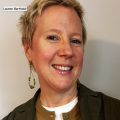
Lauren Barthold, Philosophy FacultyI’ve learned that it is not enough to announce my commitment to dialogue and expect students to know what I mean; I need concrete exercises to allow students to learn how to do it.
Endicott College, Massachusetts

Karen Ramirez, Director of the CU Engage ProgramWe get more requests [for campus dialogue] than we could ever respond to.… I’m proud that our work on campus is actually kind of unusual, because it doesn’t support just one population. It supports everyone—students, staff, faculty, graduate students. I don’t know if there are other University of Colorado projects going on that hit all of our campus population.
University of Colorado, Boulder
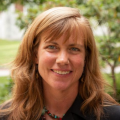
Dr. Jill DeTemple, Religious Studies FacultyAfter using this approach in my classroom, I am now more willing, and more able, to engage students in meaningful conversations about potentially contentious issues. Whereas I used to nod toward things like homosexuality in religious life, interfaith marriage, or the role of government in reproduction, now I build these conversations into the class so students can learn to speak about their experiences, and so they learn to listen and learn from those with whom they might disagree.
Southern Methodist University, Texas

Noga Shemer, Associate Professor in Anthropology“Students come to university so they can think deeply about issues that matter. They are the future, and the stakes are high. They want spaces where they can think these things through.”
University of Connecticut

Undergraduate StudentI learned to expect the best of my classmates, even when we don’t agree. I can’t write off their opinions anymore, despite our disagreements.
Bridgewater College, Virginia

Noga Shemer, Associate Professor in Anthropology“When I started bringing the RSD model into the classroom, it changed everything, and I had this overwhelming sense of what the classroom could be. The student feedback was unlike anything I had seen before. Students said, ‘Wow, why haven’t we had the chance to do this before? And why don’t we get to do this more often in our education?’”
University of Connecticut

Program ParticipantThis is the best adult learning experience I have had in the past five years. I wanted to learn new skills—I did!

Bob Bordone, Expert and AuthorEssential Partners does the best work in the field of dialogue and communication.
Harvard Negotiation & Mediation Clinical Program, Co-Founder

Undergraduate StudentI feel more comfortable participating in class and less defensive when other students disagree. And because I learned more from my fellow students about their views, I now feel less competitive with them than in other classes.
Bridgewater College, Virginia

Megan DeFranzaHere safe space was created for pastors and church leaders to wrestle with topics like evolution which are all too often “off limits” or believed to be antagonistic to the faith.
Gordon College, Massachusetts

Program ParticipantI felt an amazing sense of accomplishment when the Essential Partners training ended; that I'd done something important for my community and something important for me.
Massachusetts

Undergraduate StudentI notice that my classmates take much more care when speaking about people who practice other religions. They make fewer assumptions, and they’re more careful with their words to make sure to avoid unintentional connotations.
Bridgewater College, Virginia

Janele Nelson, Mission DirectorIn these divisive times, Essential Partners has given my local YMCA and now the national YMCA a means to build bridges through dialogue, re-establishing foundations for constructive change to occur.
YMCA of Pierce & Kitsap Counties (WA)

Jamie Kleinman, Associate Professor“I want every STEM class to have a dialogue. Imagine if the students had more practice doing this in more of their classes. It really speaks to the nature of approaching this from a systems perspective and how big a need there is for that.”
Department of Psychological Science, University of Connecticut

Patrick Hale, director of Multicultural and Identity ProgramsOne of the things that’s so crucial to even fostering dialogue around diversity, equity, and inclusion is creating opportunities for folks to engage in deep reflective self-awareness.
Babson College, MA

Undergraduate StudentIt’s nice to talk about things that we encounter all the time but rarely get talked about. This made me hopeful that there are people who are willing to talk about serious issues.
Dartmouth College, New Hampshire

Ben Meoz, VP for Student Life and Dean of Students“We want to cultivate genuine curiosity among students so that they really open themselves to the needs of others and also feel like others have an awareness of what their needs and experiences are.”
Lewis & Clark

Undergraduate StudentI learned a lot about myself from others’ perspectives—it was comforting to hear similar values and ideas expressed, yet really eye-opening and intriguing to hear very different philosophies.
Dartmouth College, New Hampshire

Etionette Nshirmirimana, Burundian Master TrainerI realized that by using the “dialogue” approach, people could talk of what is deep in their heart, especially things that have harmed them.
Burundi

Jonathan Noyalas, Director of the McCormick Civil War Institute“RSD has been the most transformative thing in my 21 years of teaching. … Students have a greater desire to open up in class about things because they know that a Noyalas class is a safe environment. ‘I can say things here. I’m not going to be judged. I understand I’m contributing to a broader conversation.’”
Shenandoah University

Dr. Brooke Vuckovic, Clinical Professor of Leadership“The Dialogic Classroom is by far and away the most skillful and thoughtful professional development I have had in years as an educator.”
Kellogg School of Management

Jonathan Noyalas, Director of the McCormick Civil War Institute“RSD has been the most transformative thing in my 21 years of teaching. … Students have a greater desire to open up in class about things because they know that a Noyalas class is a safe environment. ‘I can say things here. I’m not going to be judged. I understand I’m contributing to a broader conversation.’”
Shenandoah University

Undergraduate StudentWe tackled really difficult topics and this helped everyone know each other and understand each person's individual perspective. Over the course of the semester, I became much more comfortable engaging with my classmates—specifically because of the peer dialogue groups.
Bridgewater College, Virginia

Cricket Fuller, The Christian Science MonitorThis wasn’t a policy debate [about guns]. Instead, two people whose backgrounds and views diverged in almost every way possible shared a moment of honesty that struck at the heart of the matter.
Boston, Massachusetts

Undergraduate StudentDuring one dialogue, as we were reading The Joy Luck Club, we were asked to discuss our relationship to America. There were students who grew up in the United States and also those who hadn’t—and I was surprised to hear that everyone had equally complex relationships with the topic.
I appreciated being able to hear and express the full depth of our own context before delving into a discussion about first-generation immigrants.
Gordon College, Massachusetts

Anjali Bal, Associate Professor of MarketingOne of the things that we talked about was the ability to hear another person’s point of view, even if our minds aren’t changed. We have to remember that any sort of movement is movement. If we don’t acknowledge small movement, then we just stay on two different sides, and it’s all black and white, and we don’t hear each other.
Babson College, MA
